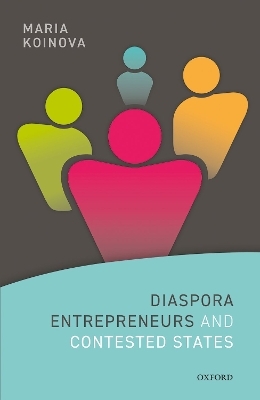
Diaspora Entrepreneurs and Contested States
Oxford University Press (Verlag)
978-0-19-884862-2 (ISBN)
Why do conflict-generated diasporas mobilize in contentious and non-contentious ways or use mixed strategies?
This book develops a theory of socio-spatial positionality and its implications for the individual agency of diaspora entrepreneurs. A novel typology features four types of diaspora entrepreneurs—Broker, Local, Distant, and Reserved—depending on the relative strength of their socio-spatial linkages to host-land, original homeland, and other global locations. A two-level typological theory captures nine causal pathways unravelling how diaspora entrepreneurs operate in transnational social fields and interact with host-land foreign policies, homeland governments, parties, non-state actors, critical events, and limited global influences. Non-contention often occurs when diaspora entrepreneurs act autonomously and when host-state foreign policies converge with their goals. Dual-pronged contention is common under the influence of homeland governments, non-state actors, and political parties. The most contention occurs in response to violent events in the original homeland or adjacent to it fragile states. The book is informed by 300 interviews among the Albanian, Armenian, and Palestinian diasporas connected to de facto states, Kosovo, Nagorno-Karabakh, and Palestine respectively. Interviews were conducted in the UK, Germany, France, Netherlands, Sweden, Switzerland, Brussels in Belgium, as well as Kosovo and Armenia in the European neighbourhood.
Maria Koinova is Professor in International Relations at the University of Warwick in the UK. She is the author of Ethnonationalist Conflict in Postcommunist States (University of Pennsylvania Press, 2013), and she has published in numerous leading journals such as the European Journal of International Relations,International Studies Review, and Foreign Policy Analysis.
1: Introduction: Individual Agency and Socio-spatial Linkages of Diaspora Entrepreneurs to Contested States
2: The Macrofoundations: Socio-Spatial Positionality of Diaspora Entrepreneurs in Transnational Social Fields
3: The Micro-Foundations: Four Types of Diaspora Entrepreneurs and a Two-Level Typological Theory
4: Albanian Transnational Social Field and Diaspora Entrepreneurs
5: Albanian Diaspora Mobilization for Kosovo Statehood
6: Palestinian Transnational Social Field and Diaspora Entrepreneurs
7: Diaspora Mobilization for Palestinian Statehood
8: Armenian Transnational Social Field and Diaspora Entrepreneurs
9: Armenian Diaspora Mobilization for Nagorno-Karabakh and Genocide Recognition
10: The Impact of Host-States and Places within them on Diaspora Mobilizations
11: Conclusions: Follow the Socio-Spatial Linkages
| Erscheinungsdatum | 31.03.2021 |
|---|---|
| Verlagsort | Oxford |
| Sprache | englisch |
| Maße | 161 x 241 mm |
| Gewicht | 714 g |
| Themenwelt | Sozialwissenschaften ► Politik / Verwaltung ► Europäische / Internationale Politik |
| Sozialwissenschaften ► Politik / Verwaltung ► Politische Theorie | |
| Sozialwissenschaften ► Politik / Verwaltung ► Vergleichende Politikwissenschaften | |
| ISBN-10 | 0-19-884862-5 / 0198848625 |
| ISBN-13 | 978-0-19-884862-2 / 9780198848622 |
| Zustand | Neuware |
| Haben Sie eine Frage zum Produkt? |
aus dem Bereich


